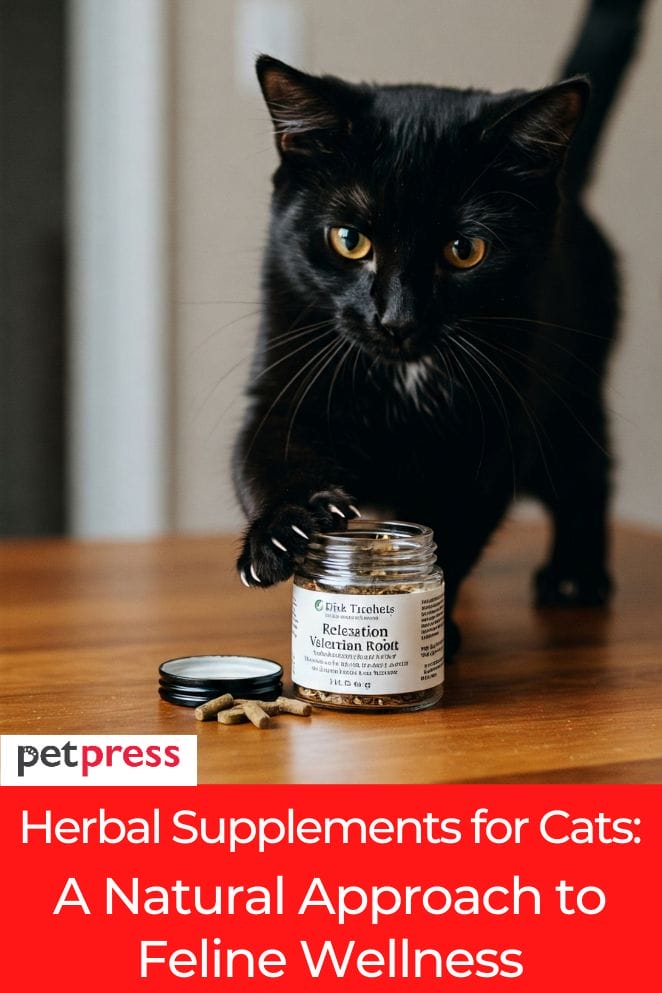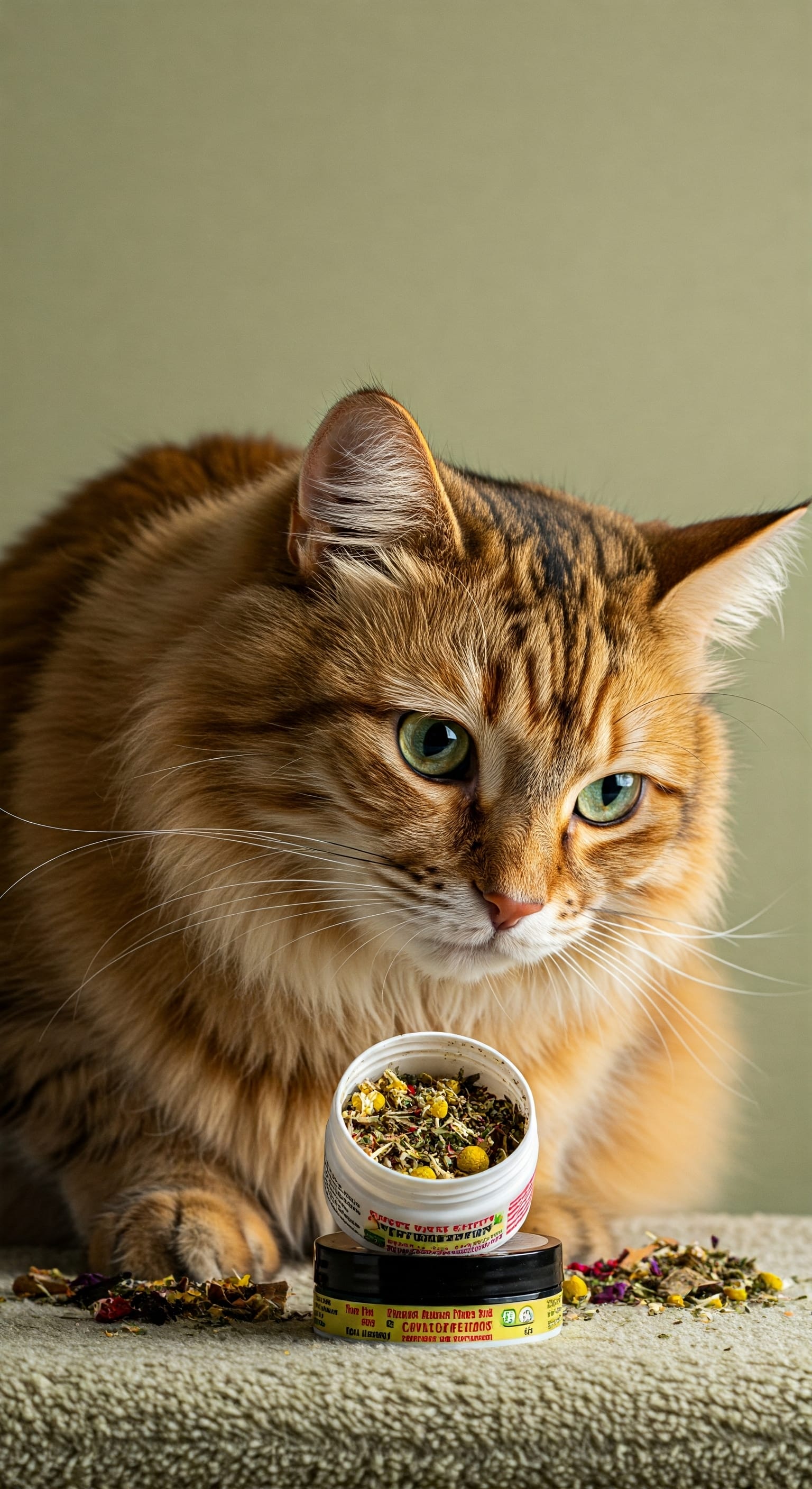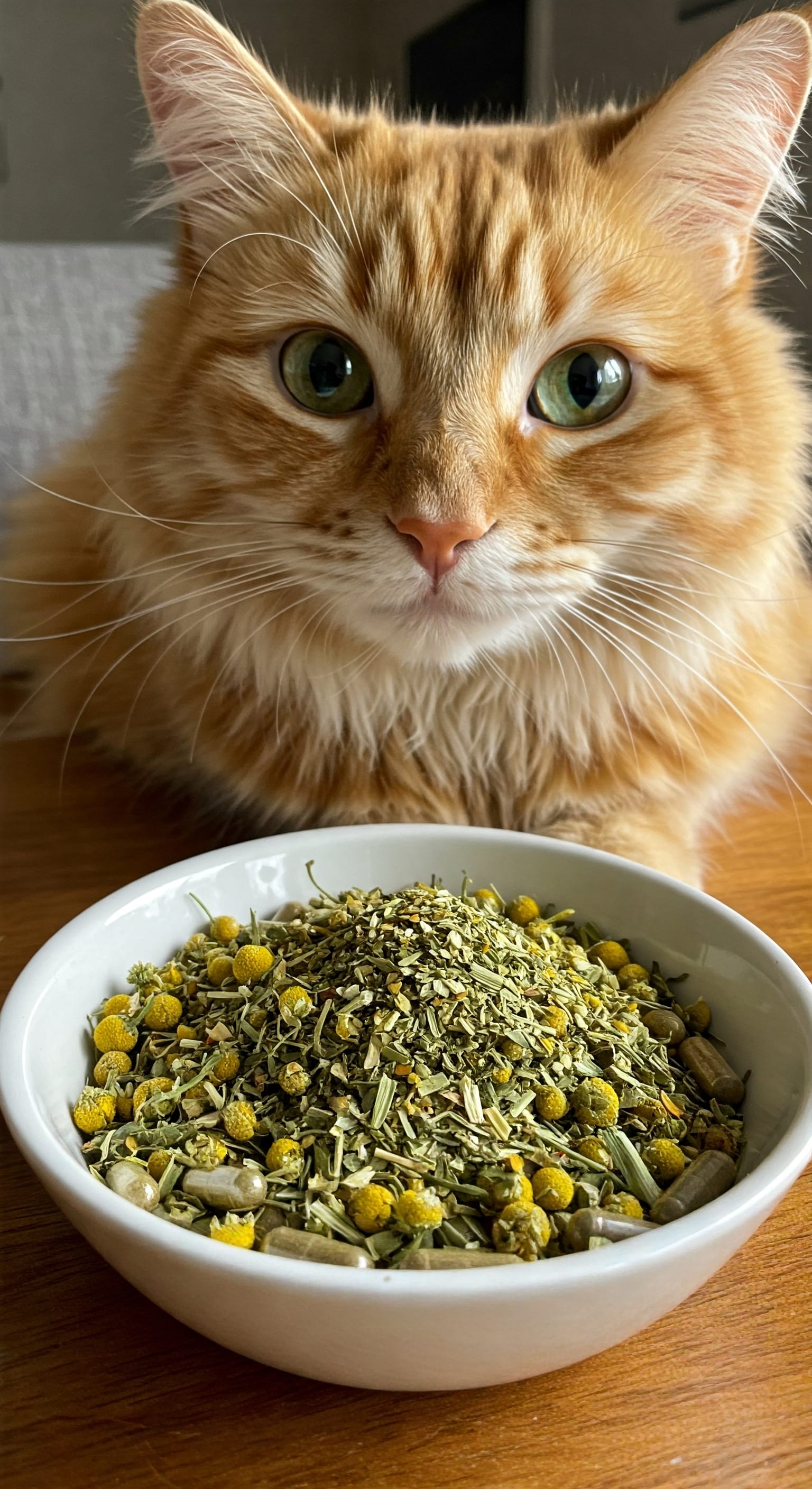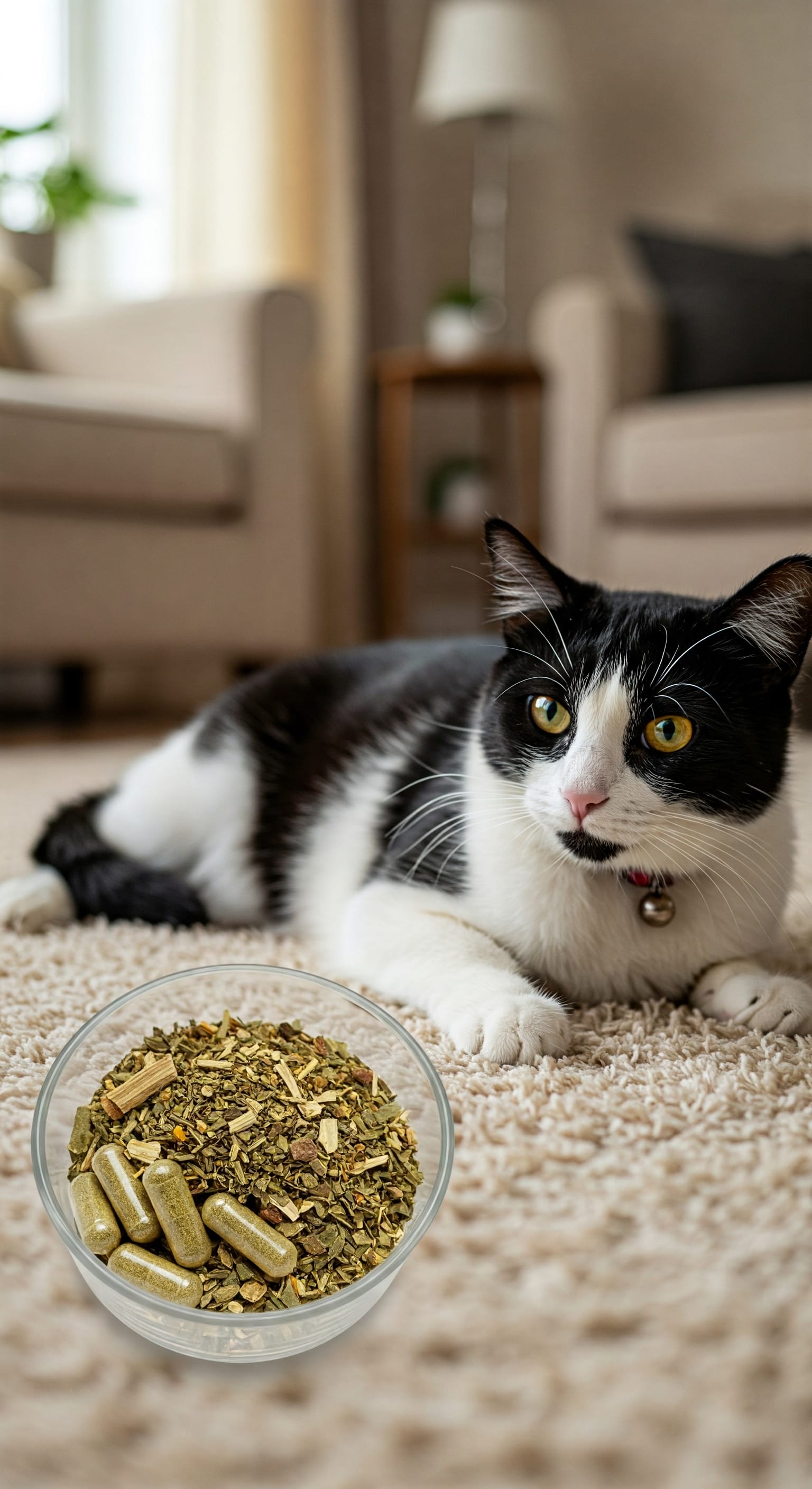
Let’s be honest—being a cat parent today is like being a personal wellness guru.
Forget just feeding them and cleaning the litter box; now it’s all about detox, calming vibes, and “Is this grain-free?”
As more of us side-eye sketchy meds and their side effects, herbal supplements for cats are having their main character moment.
Imagine your cat watching you drink your oat milk matcha and thinking, “Where’s my plant-based magic, Brenda?”
This guide breaks down the good, the sketchy, and the downright weird in the world of herbal cat care—so you can keep your kitty chill, healthy, and not accidentally toxic.
Whether you’re a crunchy pet parent or writing content for the holistic cat crowd, we’ve got you.
Why Consider Herbal Supplements for Cats?
You know how you started taking turmeric for your joints, popping elderberry gummies like candy, and sipping mushroom lattes for “immune support”?
Yeah—your cat’s ready for that soft life too.
Herbal supplements can help your kitty with all sorts of stuff: tummy troubles, anxiety, creaky joints, mystery sneezes—you name it.
And unlike sketchy meds with a CVS receipt full of side effects, herbs tend to be gentler and pull double (or triple) duty.
What’s in it for your feline overlord?
- Less cranky joints – Great for older cats who move like a 2002 Honda Civic in winter.
- Chill vibes – For anxious kitties who freak out at the sound of the vacuum.
- Immune system glow-up – Fewer vet visits = more cash for fancy litter.
- Detox backup – Helps the liver do its thing without working overtime.
- Flea-fighting power – Naturally keeps the itchies away without the chemical storm.
Bonus: they come in cat-friendly forms like powders, tinctures, and even treats.
So, no need to wrestle your cat like it’s the final round of WWE SmackDown.

Popular Herbal Supplements for Cats
Herbs aren’t just for your green smoothies and TikTok wellness trends—some of them are legit game-changers for your cat’s health.
Whether you’ve got a spicy tabby or a nervous fluffball, these plant-based powerhouses might just be the holistic upgrade your kitty didn’t know they needed.
1. Catnip (Nepeta cataria)
- What it does: Helps your cat vibe out, destress, or turn into a zoomie-fueled tornado.
- Science-y bit: Nepetalactone is the magic compound that makes cats go full rave mode.
- Use it for: Playtime, boredom, or mild anxiety (just not before a Zoom call—you’ll regret it).
2. Valerian root (Valeriana officinalis)
- What it does: Calms the nerves and brings on the Zzz’s.
- Pro tip: Some cats mellow out, others get hyped like they just did a pre-workout shot. Test the waters first.
- Backed by science: Studies show it can help pets chill. Think sleepy spa day—but for your cat.
3. Milk Thistle (Silybum marianum)
- What it does: Gives your cat’s liver the TLC it deserves.
- Why it matters: Great if your cat’s been on meds or got into something sketchy. Contains silymarin, a fancy antioxidant your vet would high-five.
- Perfect for: The kitty equivalent of a juice cleanse—without the kale.
4. Chamomile (Matricaria chamomilla)
- What it does: Soothes inflammation and nerves.
- Important note: Only use German chamomile. Roman chamomile? Nope—hard pass. It’s toxic for cats.
- Think of it as: A warm cup of tea for your cat’s soul (minus the teacup and judgment).
5. Slippery Elm (Ulmus rubra)
- What it does: Coats the stomach and calms the tummy.
- Use it when: Your cat’s dealing with puke parties or the dreaded diarrhea dash.
- Bonus: Also great for hairball help. Less gagging, more lounging.
6. Licorice root (Glycyrrhiza glabra)
- What it does: Fights inflammation and helps with allergies.
- Best for: Itchy skin, sneezes, and anything that makes your cat look like they’re auditioning for a seasonal allergy commercial.

Safety First: Herbs That Are Toxic to Cats
Before you go full moonchild and start sprinkling herbs like you’re in a cottagecore TikTok video—STOP.
Cats have super-sensitive systems, especially their livers, which can’t handle a lot of the stuff that’s safe for us humans (or dogs).
Basically, they’re tiny, adorable divas when it comes to detoxing.
Herbs & oils to keep far away from whiskers:
- Garlic & onion: Nope. Not even a sprinkle. These can wreck your cat’s red blood cells and cause anemia. (So no sharing your garlic bread, sorry.)
- Tea tree oil: Super toxic. Even a whiff or lick can lead to scary stuff like tremors and seizures. Total no-go.
- Pennyroyal: Sounds cute, is actually evil. Can damage the liver and cause seizures. Burn the bottle.
- Eucalyptus: Smells great in your diffuser, but if your cat even breathes it in or licks it, it’s big trouble.
Moral of the story? If you’re not 100% sure a herb is cat-safe, don’t risk it. Call your vet.
Better yet, call a vet who gets holistic stuff—someone who won’t side-eye you for saying “adaptogens” out loud.
How to Choose a Quality Herbal Supplement
The pet supplement aisle can feel like the Wild West—shiny labels, lofty promises, and no FDA referee in sight.
So, how do you know what’s legit and what’s just catnip-scented snake oil?
Here’s what to check before you click “Add to Cart”:
- Vet-formulated: If it’s made by someone who actually went to vet school, that’s a green flag.
- Certified organic: No pesticides, no drama.
- Full disclosure labels: You want botanical names, actual dosages, and zero mystery ingredients.
- GMP-certified: Stands for “Good Manufacturing Practice”—aka, they didn’t make it in someone’s garage.
Oh—and do a little detective work: Read reviews from other cat parents. If everyone says “this helped with Fluffy’s anxiety” and no one’s cat turned into a werewolf, you’re probably good.
Integrating Herbal Supplements Into a Cat’s Routine
Let’s be honest—cats are basically tiny gourmet food critics with trust issues.
So dropping herbal supplements into their routine? Yeah, it’s gonna take some finesse.
But don’t worry—you’ve got this. It’s all about strategy, stealth, and maybe a little bribery.
Sneaky but smart tips:
- Start small: Like, microscopic. Mix a teeny bit into their fave wet food and act like nothing’s happening. James Bond vibes only.
- Bring in the big smells: Tuna, bone broth, sardine juice—anything that’ll mask that “earthy” herb scent like a pro.
- Try chews that taste like treats: Lots of brands now make herb-infused goodies your cat will actually want to eat. It’s like a Flintstones vitamin, but sassier.
Keep an eye out for any weird behavior—like puking, zombie naps, or “where’s the bathroom?” emergencies.
If your cat’s acting off, stop the herbs and hit up your vet.

The Role of Veterinary Oversight
Listen, herbal supplements can be amazing—but this isn’t a Pinterest DIY moment.
Cats are complex little creatures, and giving them the wrong herb (or the right herb in the wrong dose) can cause way more harm than good.
That’s why you want a vet who knows their stuff—not just a general vet, but ideally someone into integrative or holistic medicine.
Think of them as the Dr. Strange of pet care: part science, part magic, all knowledge.
Here’s what a holistic-savvy vet can do:
- Help you pick the right herbs for your cat’s actual needs (no guessing games)
- Make sure you’re not mixing something dangerous with your cat’s meds
- Give you dosing advice that doesn’t involve Googling and hoping for the best
Look for pros certified by the American Holistic Veterinary Medical Association (AHVMA) or vets trained in herbalism.
They won’t just smile politely while you say “reishi mushroom”—they’ll actually help you use it right.
Final Meow: Herbs, Health & Happy Cats
Herbal supplements for cats offer a compelling alternative for pet owners looking to support their cats?
Totally worth a look if you want to level up your kitty’s wellness game.
They’re not a magic fix (sorry, not Hogwarts), and they don’t replace vet visits—but they can help your cat chill out, feel better, and live their best soft life.
Just be smart: do your research, chat with a herb-savvy vet, and don’t go overboard (yes, even if you’re obsessed with turmeric).
Mix ancient wisdom with modern vet care, and boom—you’ve got a happy, healthy, holistic fluffball.
Stay extra, plant-based cat parent. You’re doing amazing.
- Does Cat Litter Melt Ice? The Complete Guide to Winter Safety - January 30, 2026
- Happy Tail Dogs: Understanding This Common Canine Condition - January 29, 2026
- How Cold Can Outdoor Cats Handle? Feline Winter Safety - January 27, 2026


GIPHY App Key not set. Please check settings